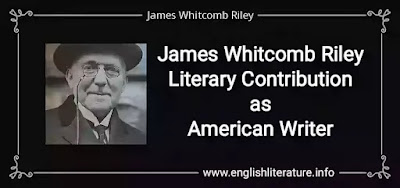Also Read
The poet of our time who has most widely voiced the everyday feeling of democracy, of the man on the farm, in the workshop, and in his home circle, is James Whitcomb Riley. Riley's popularity with this generation suggests the part which the ballad makers played in developing a love for verse before Shakespeare came.
Riley was born in the little country town of Greenfield, twenty miles east of Indianapolis in 1853. Like Bret Harte and Mark Twain, Riley had only a common school education. He became a sign painter, and traveled widely, first painting advertisements for patent medicines and then for the leading business firms in the various towns he visited. After this, he did work on newspapers and became a traveling lecturer, and reader of his own poems.
Much of his poetry charms us with its presentation of rural life. In The Old Swimmin'-Hole and 'Leven More Poems (1883), it is a delight to accompany him
"When the frost is on the punkin and the fodder's in the shock," or when "The summer winds is sniffin' round the bloomin' locus' trees, And the clover in the pastur' is a big day fer the bees," or again, in Neighborly Poems (1891), as he listens to The First Bluebird singing with "A breezy, treesy, beesy hum, Too sweet fer anything!" We welcome him as the champion of a new democratic flower. In his poem, The Clover, he says:— "But what is the lily and all of the rest Of the flowers, to a man with a hart in his brest That was dipped brimmin' full of the honey and dew Of the sweet clover-blossoms his babyhood knew?"
Like Eugene Field, Riley loved children. His Rhymes of Childhood (1890) contains such favorites as The Raggedy Man, Our Hired Girl, Little Orphant Annie, with its bewitching warning about the "Gobble-uns," and the pathetic Little Mahala Ashcraft.
But no matter whether his verses take us to the farm, to the child, to the inner circle of the home, or to a neighborly gathering, their first characteristic is simplicity. Some of his best verse entered the homes of the common people more easily because it was written in the Hoosier dialect. He is a democratic poet, and the common people listen to him. In Afterwhiles (1887), he says:—
"The tanned face, garlanded with mirth, It hath the kingliest smile on earth— The swart brow, diamonded with sweat, Hath never need of coronet." In like vein are his lines from Griggsby's Station:— "Le's go a-visitin' back to Griggsby's Station— Back where the latch string's a-hangin' from the door, And ever' neighbor 'round the place is dear as a relation— Back where we ust to be so happy and so pore!" In lines like the following from Afterwhiles, there is a rare mingling of pathos and hope and kindly optimism:— "I cannot say, and I will not say That he is dead.—He is just away! "With a cheery smile and a wave of the hand, He has wandered into an unknown land, "And left us dreaming how very fair It needs must be, since he lingers there." The charitable optimism of his lines:— "I would sing of love that lives On the errors it forgives," has touched many human hearts. Furthermore, he has unusual humor, which is as delightful and as pervasive as the odor of his clover fields. Humor drives home to us the application of the optimistic philosophy in these lines:— "When a man's jest glad plum through, God's pleased with him, same as you." "When God sorts out the weather and sends rain, W'y, rain's my choice."
In poems like Griggsby's Station he shows his power in making a subject pathetic and humorous at the same time.
Albert J. Beveridge says of Riley, "The aristocrat may make verses whose perfect art renders them immortal, like Horace, or state high truths in austere beauty, like Arnold. But only the brother of the common man can tell what the common heart longs for and feels, and only he lives in the understanding and affection of the millions."
